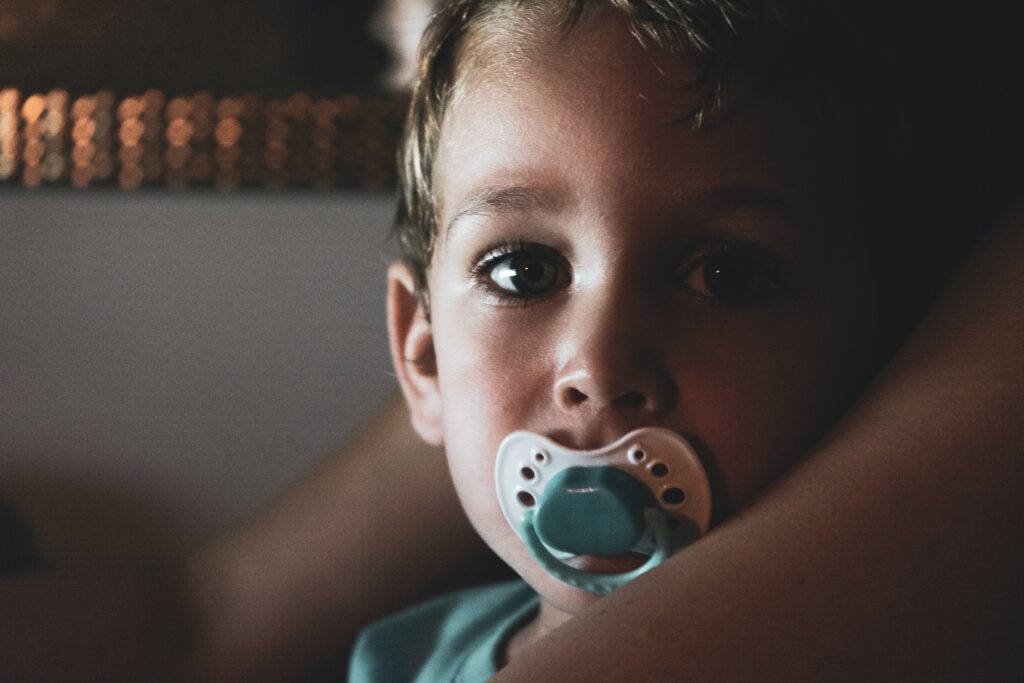If you have an autistic child who will regularly scream at night, as alarming as it is you are not alone.
In this article we explain why it may be happening and what you can do.
Autism and screaming at night
Raising a child with autism can be challenging in a number of ways.
One of the challenges faced by parents and caregivers is understanding and managing their behaviour, especially when it comes to sleep disturbances.
Many autistic children may scream at night, which can be distressing for both the child and the caregiver. We will explore some of the possible reasons why this behaviour is occurring.

Sensory overload
One of the hallmarks of autism is hypersensitivity to sensory stimuli. This can include sensitivity to light, sound, touch, taste, and smell.
For some autistic children, the sensory overload they experience during the day can carry over into the night. This can end up making it difficult for them to fall asleep and stay asleep.
A sudden noise, a change in temperature, or an uncomfortable texture of bedding may be enough to trigger a screaming episode.
Sensory overload may also cause an autistic child to feel overwhelmed and anxious, which can manifest as screaming.
Sleep disorders
Research suggests that sleep disturbances are more common in autistic children than in typically developing children.
Sleep disorders such as insomnia, sleep apnea, and restless leg syndrome may contribute to the behaviour.
Autistic children may have difficulty falling asleep, staying asleep, or waking up too early.
These sleep disruptions can lead to exhaustion and irritability during the day and may exacerbate other symptoms of autism.
Communication issues
Many autistic children struggle with communication, especially when it comes to expressing their needs and emotions.
If a child is unable to communicate their discomfort or frustration, they may resort to screaming as a way to express themselves.
This can be particularly challenging for nonverbal autistic children who may have limited means of communicating their needs.
You could try to provide alternative methods of communication, such as pictures, gestures, or a communication device.
Anxiety
Sadly anxiety and stress are common among autistic children, who may feel overwhelmed by the demands of the environment around them.
Anxiety can be particularly problematic at night when there are fewer distractions to occupy the child’s attention.
Autistic children may worry about school, social situations, or changes to their routine, which can cause them to feel anxious and agitated.
Night-time screaming may be a manifestation of this anxiety and stress.
What to do if your autistic child is screaming at night?
We have a number of articles relating to improving your autistic child’s sleep behaviours. You can review them here and here.
Essentially however parents who have made the most progression with their child’s sleep have concentrated on the following;
- Create and stick to a bedtime routine
- Minimise stimulation before bed
- Adjust their sleeping environment to sensory needs
- Work on communication
To make inroads with your child’s sleep you will need to be consistent and patient but progress is possible.
Summary – Why may an autistic child scream at night?
Night-time screaming is a common challenge faced by parents and caregivers of autistic children.
The causes of night-time screaming can be complex and multifaceted.
It is important to remember that each child is unique and may have different triggers for their behaviour.
It is also crucial to work with healthcare providers and behavioural specialists to identify and manage the underlying causes of night-time screaming.
Parents and caregivers should also ensure that their child has a calming bedtime routine and a comfortable sleeping environment to help them feel safe and secure at night.
With patience and understanding, it is possible to help autistic children manage their night-time behaviour and improve their overall quality of life.

